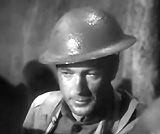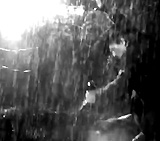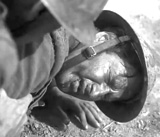
|
Sergeant York (1941)
In director Howard Hawks' true, inspirational, but
unusual biographical (biopic) story, it told of the Great War's biggest
war hero (Alvin York), and was the highest grossing film of the year;
it was a sensitive, affecting, and compassionate portrayal of York
with fast-paced action sequences and some wartime propagandizing
(as the US was becoming more involved in WWII). The war film was
heightened by Max Steiner's effective musical score:
- the opening credits sequence included a boom shot
down a Tennessee river
- the authentic war saga offered a portrait of poor
mountain boy and sharp-shooting farmer Alvin C. York (Best Actor-winning
Gary Cooper) living in the backwoods Tennessee Valley of the Three
Forks of the Wolf before the US' entrance into the Great War in Europe
in 1916
- his hot-headed brawling, drunken and hell-raising
life in Pall Mall changed when he fell in love with grown-up, local,
teenaged Gracie Williams (Joan Leslie); although attracted to Alvin,
when he asked for her hand in marriage, she rejected him: ("I
wouldn't have you on a Christmas tree, Alvin York! Hmm, fine husband
you'd make!...Folks say you're no good except for fightin' and
hell raisin' and I'm thinkin' they're plumb right");
to impress her, and to steal her away from a rival suitor, Zeb
Andrews (Robert Porterfield), the determined Alvin worked hard
to buy some farming bottomland for them sometime in the future
as he promised ("There ain't nothing I can't get if I set my mind
to it")

|

|

|
|
In Backwoods Tennessee: Alvin York (Gary Cooper)
Fell in Love with Local Girl Gracie
Williams (Joan Leslie)
|
- later, when an angered and bitter
Alvin sought revenge for being cheated out of some bottomland, he had a
life-changing religious experience signaled by a bolt of lightning
during a thunderstorm; as he was riding along on muleback, a flash
of lightning struck closeby, and he awoke on the ground after being
thrown off; he noticed that his mangled rifle (with a split barrel)
had served as a lightning rod and had saved his life
- Alvin's fortunes turned for the better when he forgave
Mr. Tomkins (Erville Alderson) for selling his promised bottomland
to Zeb, and then Zeb offered to let Alvin till the land on a share-crop
basis as a way to buy the land sometime in the future; he also
learned from a spiteful Gracie, who sternly lectured him while
wielding a large knife, that she only wanted him (and not Zeb),
and that she didn't care about bottomland or a beef cow: ("If I
wanted Zeb Andrews for a husband, I reckon I could get him without
your actin' so noble. I done kissed ya, didn't I?... Well, I don't
go around kissin' men I ain't gonna be a-marryin'. Now you be a-listening'
to me. Am I marryin' a piece of land?...Or a beef critter?...Or
a field of corn? No, it's you I'm marryin', ain't nobody else in
this here world. Are you hearin' me?")
- the Great War progressed and by mid-1917,
Alvin refused to register for the draft after he had become deeply
religious and pacifistic; he vowed to Pastor Rosier Pile (Walter
Brennan): ("I ain't a-goin' to war. War is killin', and the book's agin' killin!
So war is agin' the book!"); his request to register as
a conscientious objector (CO) was denied, and he was reluctantly
drafted into military service after all appeals failed
- after a tearful goodbye to Gracie, Alvin was sent
to Camp Gordon in Georgia, and impressed his superiors with his
great marksmanship by hitting five consecutive bulls-eyes

Boot Training Camp: York in Camp Gordon in Georgia
|

Five Bulls-Eyes in a Row During Military Training
|
- in a crossroads about the direction of his life during a
short leave of absence at home, as he sat on a rock ledge, he read the
Biblical passage in Matthew: "Render unto Caesar the things
that are Caesar's, and unto God the things that are God's" -
he decided to accept a promotion to the status of Corporal, and was
shipped out to Europe to the war front
- York heroically fought in the Great War during
many fast-paced action scenes, including tracking shots of York's
scramble through no-man's land; most
famously in the Battle of the Argonne Forest in 1918, Sgt.
York (almost single-handedly) killed about 25 Germans (some
were in a machine gun nest) to save his comrades - by using the tactic
of sneaking up on them from behind and picking them off from the
rear first: "Just like a flock of turkeys"; he also forced a white-flag truce
and captured a large regiment of 132 German soldiers, and escorted
them to a camp with only 7 other soldiers

In the War Trenches During the Argonne Forest Battle
|

York Single-Handedly Cleaned Out a German "Machine-Gun Nest"
|

|

|
|
Marksman York During the War
|
- York became very disheartened by the
ambush-killing of his best friend "Pusher" Ross (George
Tobias), a Bronx NY subway guard, who died from a grenade blast
at close range, thrown by one of the captured Germans
- afterwards, York explained his reasoning about why
he changed his mind about killing - it was to save US lives: "When
I hear them machine guns a-goin' and all them fellas are droppin'
around me, I figured that them guns was killin' hundreds, maybe
thousands, and there weren't nothin' anybody could do, but to stop
them guns. And that's what I done"
- York became the most decorated soldier of the war
both in France and US, with medal ceremonies to praise his bravery;
he was lauded by Gen. John J. Pershing, the leader of the AEF
(American Expeditionary Forces), and received the Congressional
Medal of Honor

The Congressional Medal of Honor Presented by AEF
Gen. Pershing to York
|

The Key to the City of NY from the Mayor
|

Homecoming in Tennessee - Greeted by Gracie
|
- upon his return to the US, he was greeted
with a ticker-tape parade in NYC, the key to NYC from the city's
mayor, and numerous temptations of wealth and fame; he was assailed
with business propositions by merchandizers to promote their products
or to make public appearances, but he refused to profit from serving
his patriotric duty: ("What we done in France was somethin' we
had to do. Some fellows done it ain't a-comin' back. So, the way
I figure, things like that ain't for buyin' and sellin'. So I reckon
I'll have to refuse 'em. Would you be a-tellin' them that for me,
please? And tell 'em I'm a-going home?")
- he soon chose to return to
his Tennessee roots, where he received a major homecoming welcome,
and to his surprise, he was gifted farmland and a house on 200
acres of prime bottomland by the people of his home state. Now,
there would be "no need to wait" to get married, according to Gracie: ("It's
yours, Alvin. It's all yours. They give it to you. The people of
the state of Tennessee for what you done....And it's for us").
Alvin responded with complete disbelief: "The Lord sure does move
in mysterious ways"
|

Gracie to Alvin: "I wouldn't have you on a Christmas tree,
Alvin York! Hmm, fine husband you'd make!"

The Determined Alvin to Gracie: "There ain't nothing I can't get if
I set my mind to it"


A Bolt of Lightning Struck Alvin's Rifle - Saving His Life

Gracie Promising Herself to Alvin: ("It's you I'm marryin'...")

Alvin Was Opposed to Going to War: ("I
ain't a-goin' to war. War is killin', and the book's agin' killin!
So war is agin' the book!")


Alvin's Tearful Goodbye to Gracie

On a Rock Ledge, Alvin Read the Words: "Render unto Caesar
the things that are Caesar's, and unto God the things that are God's"

The Death of Alvin's Friend "Pusher" Ross (George Tobias)

York's Reasoning About Changing His Opinion About Killing


Return to Tennessee: With 200 Acres of Farmland and a House - A Gift
From the State of Tennessee
|














